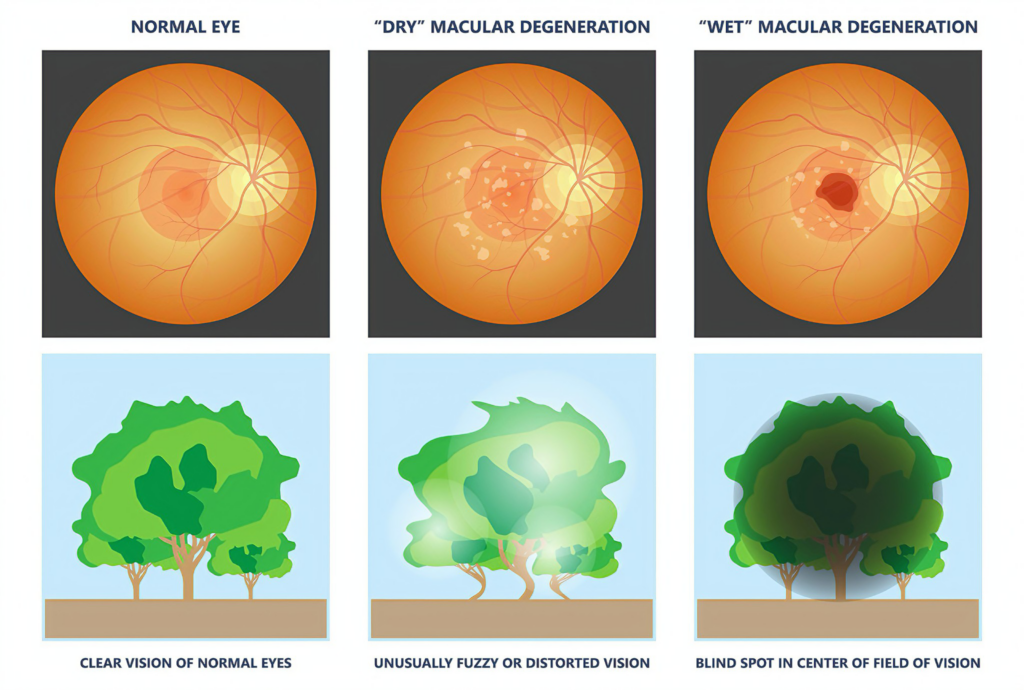Protecting Your Vision: What You Need to Know About Age-Related Macular Degeneration (AMD)

Age-related macular degeneration (AMD) is a leading cause of vision loss among adults over 50. It affects the macula, the central part of the retina responsible for sharp, detailed vision. A macular degeneration eye exam is essential for early detection and vision protection. While AMD does not lead to complete blindness, it can significantly impact daily life by making activities like reading, driving, and recognizing faces more difficult. Since AMD is a progressive condition, early detection and proactive eye care are essential for preserving vision.
Many people do not realize they have AMD until it has already started affecting their eyesight. That is why regular eye exams play a crucial role in detecting the condition early and taking steps to manage it effectively.
Understanding AMD: What Happens to Your Eyes?
AMD occurs when the macula deteriorates over time, leading to blurred or distorted central vision. There are two primary types of AMD:
Dry AMD is the most common form, affecting about 90% of people with AMD. It develops gradually as the macula thins and accumulates drusen—small yellow deposits that interfere with vision. Early stages of dry AMD may not cause noticeable symptoms, but as the condition progresses, it can lead to central vision loss.
Wet AMD is less common but more severe. It occurs when abnormal blood vessels grow under the retina, leaking fluid and causing rapid vision loss. Wet AMD requires immediate medical attention to prevent further damage.
Since AMD develops slowly, symptoms may not be noticeable in the early stages. By the time vision problems arise, the disease may have already progressed significantly. That is why comprehensive macular degeneration eye exams are critical for identifying AMD early.
Who Is at Risk for AMD?
Several factors increase the risk of developing AMD. While age is the most significant risk factor—most cases occur in people over 50—other contributors include family history, smoking, poor diet, high blood pressure, high cholesterol, and excessive exposure to UV light. Although these risk factors cannot be completely eliminated, adopting a healthy lifestyle can support overall eye health and reduce the chances of developing AMD.
Can AMD Be Prevented?
While there is no guaranteed way to prevent AMD, certain habits may help slow its progression and protect vision. Regular macular degeneration eye exams are essential, as they allow doctors to monitor eye health and detect changes before they become serious. A balanced diet rich in essential nutrients such as lutein, zeaxanthin, and omega-3 fatty acids supports macular health. Quitting smoking, managing blood pressure and cholesterol, and protecting the eyes from harmful UV rays also contribute to long-term eye health. By taking proactive steps, individuals can reduce their risk of vision deterioration and maintain better overall eye function as they age.
Why Seeing an Eye Doctor Is Essential
Since AMD progresses gradually, many people do not notice vision changes until significant damage has occurred. Regular macular degeneration eye exams allow doctors to detect early signs of macular degeneration and take appropriate steps to monitor its progression.
At OptiCare Health, our experienced eye doctors specialize in comprehensive eye exams and advanced retinal imaging. If we detect AMD or any other eye condition, we provide guidance on the next steps based on your individual needs. In some cases, adjusting glasses or lenses may help improve visual clarity. If further intervention is necessary, we can refer you to a specialist for additional evaluation and care.
Take Control of Your Eye Health Today
Your vision is one of your most valuable assets, and protecting it starts with regular eye care. Even if you have no noticeable symptoms, routine macular degeneration eye exams can help identify conditions like AMD before they significantly impact your eyesight. Early detection and proactive eye care make a difference in maintaining clear vision for as long as possible.
At OptiCare Health, we are committed to helping you preserve your sight. Our comprehensive eye care services ensure that you receive expert evaluation, personalized guidance, and referrals to the right specialists when needed.
Don’t wait until vision problems arise—schedule a AMD eye exam today and take the first step in safeguarding your sight for the future.
